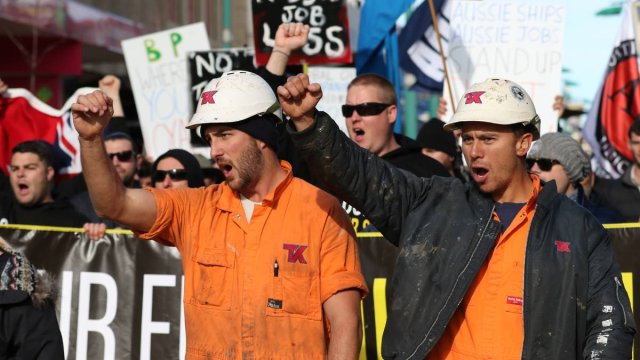
The crew of Caltex oil tanker the Alexander Spirit have ended a three-week industrial dispute that began on July 2. They have set sail from Tasmania to Singapore, where the company intends to replace the Australian crew with seafarers on drastically reduced pay and working conditions.
The Alexander Spirit is the fifth tanker that primarily circuits the Australian coastline to have its crew replaced in 12 months.
The tanker had been in Devonport since the start of July. Initially, the crew were told the vessel was going to Singapore to have its hull cleaned. Later the crew were told they would be replaced in Singapore. They refused to sail the vessel and for three weeks the Maritime Union of Australia (MUA) organised a community picket.
A number of rallies were organised, including a day-long picket at Caltex's Kurnell storage facility in Sydney on July 20.
However, on July 10 the Fair Work Commission deemed the action in Devonport to be illegal.
The only Australian-crewed tanker now is the BP-owned British Fidelity.
Another tanker moored only a short distance away paints a stark picture of the future of the Alexander Spirit.
The Stilto Kikyo is a Liberian-flagged tanker with a Chinese crew which, due to legal loopholes, is allowed to service the Australian coast. Recently, the International Transport Federation found that the crew of the Stilto Kikyo had not been paid wages stipulated under Australian law. The two months of wages owed is valued at $250,000.
The underpayment of wages, human rights abuses and the wanton destruction of the environment are widespread practices on “flag of convenience” vessels. This is the practice of registering a ship in a sovereign state different to that of the ship’s owners.
It is a way to avoid paying wages and abiding by the legal requirements of the nation that the ship primarily works under. Ships flagged under Panama, Liberia and the Marshall Island account for almost 40% of the entire world fleet.
Caltex recently reported a half-year profit of $251 million. Sacking multiple crews of the Australian tanker fleet is not an isolated incident: it is part of a concerted plan by multiple companies to smash unionised labour on the Australian coast. It is union-busting organised on an industry-wide scale: it includes industrial and legislative attacks on organised labour.
The federal government recently proposed changes to shipping legislation, including removing the requirement for companies employing foreign seafarers on domestic routes to pay them standard Australian wages.
This already happens on several ships in domestic trade, such as the Stilto Kikyo. But it would allow Australian cargo to be carried on ships where the average seafarer would be paid as little as $2 an hour.
The government has also resuscitated a John Howard-era law that excised significant parts of the Australian coast from the migration zone. This was done to make it harder for refugees to seek asylum.
It now allows the Australian oil and gas industry to employ workers who do not have visas and who are not subject to Australian labour standards. It means that large parts of Australia are outside the rule of law.
The MUA and the Australian Maritime Officers Union believe it is illegal and unconstitutional and are challenging this in the courts.
Prime Minister Tony Abbott’s anti-union agenda includes allowing the most potentially environmentally destructive part of the industry to be governed by the lowest possible industrial standards. If he succeeds, generations of young people will be denied meaningful employment on their own coastline, and foreign seafarers will be more exploited than ever.
Like the article? Subscribe to Green Left now! You can also like us on Facebook and follow us on Twitter.